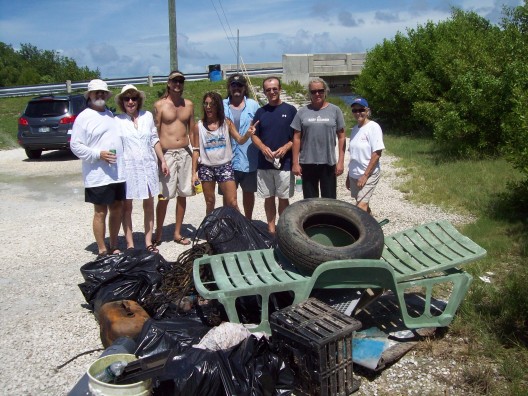Reef Relief would like to thank all the amazing volunteers who came out to the 25th year of the International Coastal Clean Up.
On Saturday, September 25th, Reef Relief volunteers took local action to heart by cleaning the shoreline of No Name Key. Volunteers removed 500 pounds of debris from the mangroves and recorded specific types of marine debris found, allowing the Ocean Conservancy to compile, analyze and track this data year by year and make discoveries about behaviors that cause debris. This information is used to educate the public, business, industry and government officials about the problem of marine debris.
Among the debris removed from the mangroves included buoys, lots of plastics, tires, trap line, dozens of aluminum cans, a lounge chair, and more. Thanks to Big Pine Kayak Adventures who provided the kayaks and assistance at the event and to the Florida Keys National Wildlife Refuge for there assistance. Raffle prizes were generously donated by Sebago Watersports, Historic Key West Walking Tour, TGI Fridays, Hard Rock Café, Ernest Hemingway Home and Museum, Big John’s Pizza and Hurricane Hole. Special thanks to Pizza Works, Winn-Dixie in Big Pine and Key West for supplies to kept our volunteers going.
What you can do
Marine debris is caused by us and we can stop it. You and your friends, neighbors, and family, can make a difference through this international effort on behalf of the ocean.
10 THINGS YOU CAN DO TO STOP MARINE DEBRIS
1) Reduce your carbon “footprint.” Our ocean is on the front lines of climate change — absorbing half the carbon dioxide we’ve pumped into the atmosphere. Use mass transit, carpool, and find other ways to reduce your carbon footprint.
2) Take only pictures. Choose vacation spots working to protect endangered sea animals. When snorkeling or diving, take pictures and tell stories but never stand on coral reefs or touch the marine life.
3) Be a green boater. Protect the boating experience along with the ocean. A little spill makes a big difference; be especially careful with oil, gasoline, solvents, and sewage. Bring your trash back to shore. Join Ocean Conservancy’s green boating program Good Mate.
4) Ask for sustainable seafood. Let chefs, wait-staff, and the folks behind your fish counter know that sustainable seafood is important to you.
5) Sign up to attend the International Coastal Cleanup. Volunteers remove trash from beaches and shorelines, and data collected by these citizen-scientists help inform solutions that keep trash out of our ocean in the first place.
6) Reduce. Since packaging materials account for much of the trash we generate, they provide a good opportunity for reducing waste consider items with less, reusable, or recyclable packaging.
7) Reuse. More than 60 percent of the litter collected during the 2009 International Coastal Cleanup consisted of disposable items. Choose reusable shopping bags, coffee mugs, and food containers.
8) Recycle. If you can’t reuse it, recycle it. Check online with your local government to see what you can and can’t give back, and recycle everything possible.
9) Prevent contaminated runoff. No matter where you live, the ocean is downstream. Don’t use chemical fertilizers and pesticides on your lawn. On the driveway, avoid harmful cleaning products, and take proper care of spilled oil.
10) Vote Blue. Urge your elected representatives to support ocean-friendly policies that protect our ocean & stay informed.
For more information visit the Ocean Conservancy’s website
